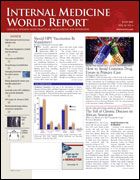Publication
Article
Internal Medicine World Report
Aggressive Glucose Control Does Not Affect Cognitive Function
Author(s):
Intensive treatment aimed at reaching normal blood glucose levels in patients with type 1 diabetes has many benefits, but it also carries the significant risk of severe hypoglycemia, which can lead to coma and seizure. Many patients worry that recurrent hypoglycemic episodes will eventually erode their cognitive function. A new, large, long-term study should put these concerns to rest.
N Engl J Med
The study (. 2007; 356:1842-1852) included 1441 patients with type 1 diabetes who had participated in the Diabetes Control and Complications Trial (DCCT) and its follow-up Epidemiology of Diabetes Interventions and Complications (EDIC) trial.
Participants in the DCCT (mean age, 27 years at entry) were randomized to intensive therapy (≥3/d insulin injections or subcutaneous infusion of insulin using an external pump) or conventional therapy (1-2/d insulin injections). In the intensive therapy group, the target preprandial blood glucose level was 3.9 to 6.7 mmol/L, and target hemoglobin A1c was <6%. There was no target blood glucose level in the conventional treatment group.
During the DCCT, the incidence of severe hypoglycemic events (defined as leading to a coma or seizure) was 3-fold higher with intensive therapy than with conventional therapy (653 vs 205 events). But at the end of the EDIC study, the number of episodes was similar (243 with intensive therapy and 254 with conventional therapy).
For this study, investigators used the same comprehensive battery of cognitive tests that were used in the DCCT to reevaluate patients at the end of the EDIC study. During a mean follow-up of 18 years, 40% of the patients reported having ≥1 hypoglycemic coma or seizure (total episodes, 1355).
Performance on all the cognition tests showed no evidence of cognitive decline, regardless of the frequency or severity of the hypoglycemic episodes. In addition, cognitive performance did not differ between the patients who were treated intensively or conventionally.
P
Even when using a broader definition of severe hypoglycemia—the patient required the assistance of another person—cognition was unaffected. And after excluding patients with a history of stroke, impaired vision, or severe kidney disease, results were again similar, except that patients receiving conventional therapy had significantly worse psychomotor efficiency ( = .002).
"Our findings of minimal or no effects of either previous intensive treatment or severe hypoglycemia should be reassuring for patients with type 1 diabetes for whom intensive therapy is strongly recommended," write Alan M. Jacobson, MD, of the Joslin Diabetes Center and Harvard Medical School, Boston, and his fellow members of the DCCT/EDIC Study Research Group.
They speculate that better glycemic control may have some benefits for cognition, just as it does for the retina, kidney, peripheral nerves, and cardiovascular system.
The investigators advise care when applying their results to all patients with type 1 diabetes, since the DCCT cohort was carefully selected and generally young.






